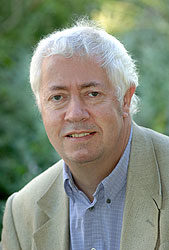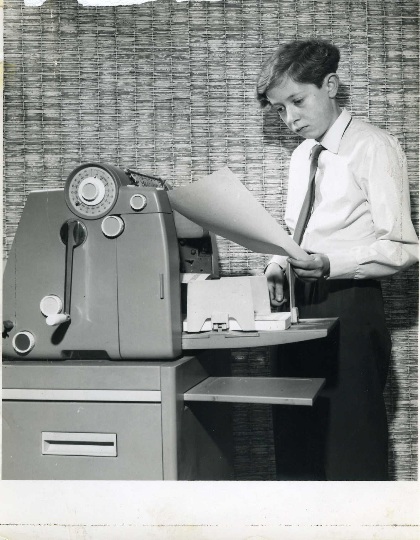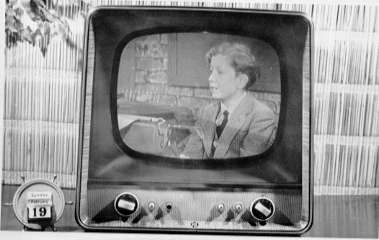

Wyn Grant today
This site sets out to tell the story of the Billericay Observer newspaper which I edited and published from 1958 to 1962. In 2006 the newspaper formed the focus of a story in a Fragment Films programme The Way We Were shown on London Carlton and Anglia television. This story was based around an old Pathé newsreel about the paper. The format used below is an outline of milestones in the paper's history and some figures and commentary about the growth of its circulation, followed by a section based on frequently asked questions about the newspaper.Wyn Grant



Television appearences were always good for circulation. This one was on the BBC All Your Own programme about youngsters' hobbies.
It's clear that the circulation almost doubled in the second half of 1961, but I'm far from clear why that was the case, although perhaps the new lay out made possible by the electric duplicator helped. After the centenary issue, circulation settled at around 1,000, although it was dropping a little by the time the paper closed. Of course, there was a big rush for the last issue as a souvenir BTW, if anyone has one, I would like a copy myself!

Why did you originally start the paper?
I had a long-term interest in starting a paper. I had asked for a typewriter as a Christmas present a few years before and I had experimented with a format (the Plumstead Chronicle in London SE18 where we used to live). I think that I was influenced by my visits to my uncle's newsagents shop and seeing all the papers there. I also had developed an interest in current affairs while I was at primary school.
Did you have a long-term plan for the development of the paper?
Not really, it was all serendipity. It started as one copy passed around neighbours and friends and then became carbon copies, initially sewn together, then stapled. After about a year I got a duplicator and then it really started to develop. I do not think it would have worked as well in another location. Billericay was expanding rapidly as a town and this created some interesting local political tensions and a high level of interest in what was happening in the town.
Did you produce it all yourself?
Certainly all the editorial content, apart from some submitted reports from local organisations. My parents helped with stapling and folding the copies which became a big job as circulation expanded.
What did the paper cover?

Getting press facilities from the local council was an important step forward
The main focus was local politics, especially the local Council, hence why obtaining press facilities was so important. Two things that were in conventional local papers were missing: court reports and sports coverage (by and large). The activities of a wide range of local organisations was covered. As a result of the Pathé newsreel, I started to get stories from the local fire brigade.
What were the biggest problems you faced?
Lots of bother from the authorities. We had to get planning permission to produce the paper from home after the local authority served an enforcement notice. We had a letter from lawyers acting for a local councillor and, after consulting solictors, had to publish an apology. And there was trouble from the tax authorities who served a big bill on me. I had to get an accountant to sort that out. The accounts had been virtually non-existent up to then. Even afterwards, I never really had a clear idea of the paper's finances, other than it produced enough to cover costs with some over to build up a capital fund. Most newsagents took one-third of the 1.5 old pence (later 2 old pence) cover price, so selling some copies outside the station was helpful. There was a reasonable amount of advertising revenue with some full page adverts.
A full page advert from the paper
Why did you close the paper?
Principally because my O level (GCSE) exams were coming up and my school work had suffered a bit. One or two people urged me to start publication again after my O levels, but I also had a sense that the format was getting a bit stale. I had gone as far as I could with what was essentially a duplicated newsletter format and going to the next level would have involved an injection of time and capital I didn't have (although there was some outside interest). I was able to carry on with my reporting as Billericay correspondent for the Brentwood Gazette and also develop the Billericay History Series booklets which were far more commercially successful than the paper.
How did running the paper affect your later life?
My original ambition was to become a journalist, but even in the sixth form I was developing academic aspirations. I have retained an interest in the media all my life and have continued to do radio and print journalism (occasionally television but I have a great face for radio). I am also active in blogging and the highly successful political economy of football site could be seen as a modern day electronic equivalent of the Observer . The discipline of producing the paper every fortnight did give me the ability to write reasonably fluently at speed which has been useful in my academic career. Ironically, I may well be remembered for the Observer long after my academic publications are forgotten.
I also published a series of pamphlets on the history of Billericay which continue to be used by visitors to Billericay Library today. Here is a sample cover: Inns
I will be pleased to answer additional questions about the paper. Please E mail me at Wyn
